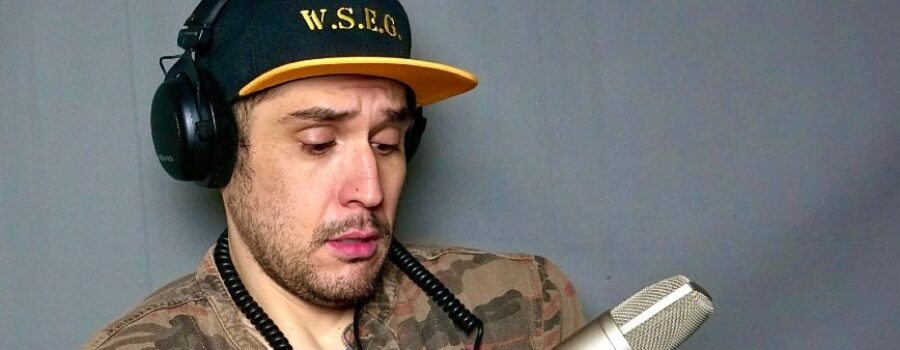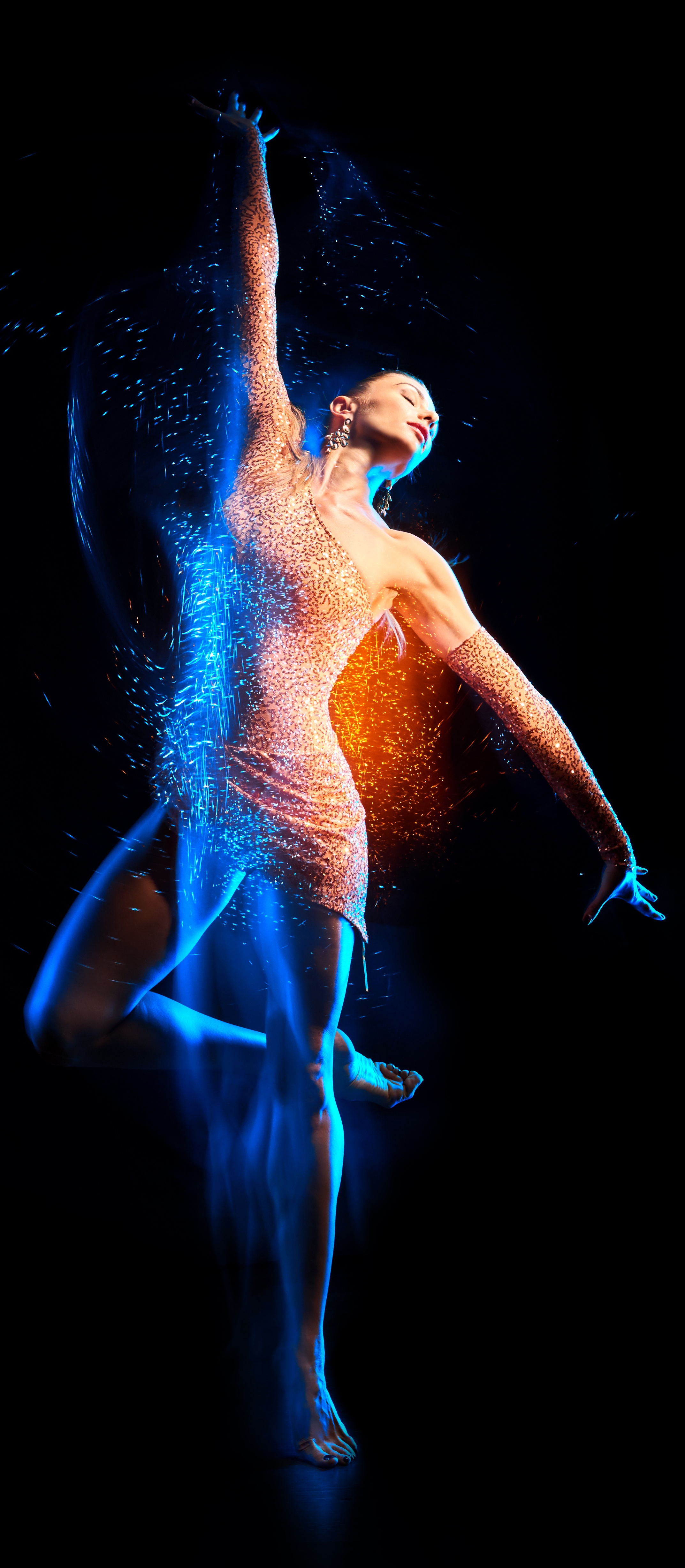When it comes to talking about music, look no further than musician/podcast host Mike Ep. He covers everything from life on the road to dealing with all the feelings swirling up inside his and his guests’ heads on ‘We Speak English Good.’ When he’s not utilizing new podcast platforms, he’s working on music, like his latest, ‘Hot Boy Summer.’ We talked about all of the above and then some in this new back and forth exchange.
Kendra: Everyone’s path towards podcasting varies. For you, it was something to do with friends but as time went on you grew with it, but when did you notice ‘We Speak English Good’ was starting to take that turn towards being more than something you did with your buddies?
Mike Ep: It wasn’t until 40 episodes in when I was able to get two-time Grammy winner Adrián Terrazas-González (saxophonist for the Mars Volta) as a guest on the show. He was my first guest with “notoriety” and the idea of having the saxophonist of one of the most seminal bands in my life, on my show, drove my anxiety through the roof. So, I did what anyone else would do in that situation and I microdosed on shrooms right before the interview. I then proceeded to tell Adrian the story of how he melted my face at the Orpheum Theatre in DTLA while on a hero’s dose of magic mushrooms.
Adrian is known for his aggressive playing and manipulating his saxophone through effects and the description of my reaction to his stylings were very detailed, to say the least. We immediately connected and had an epic conversation about some of the inner workings of a band that had a huge impact on me. After the interview was over I felt incredible and I had a sense that the show could be something more than bawdry bar room banter that my friends and I would usually rely on.
Kendra: It’s no surprise that you’re able to connect so well with your guests because you’re a musician and you’re married to one as well. Do you feel like being that deep into music has helped you move past those cliche questions music makers always get in interviews?
Mike Ep: Absolutely! Being a working musician you build a bond with your fellow musicians. From playing for annoyingly drunk tourists to long bus rides across huge swaths of the country in cramped spaces, you are in the trenches and battle builds lifetime bonds. So, being able to relay that to a guest is an instant connection. And that’s what it’s all about at the end of the day, connection. Connection dictates whether a conversation is going to be riveting or like pulling teeth.
Don’t get me wrong, there is nothing wrong with cliche questions. Sometimes, people just want to know about where the band came up with the name and how they all met. I still rely on cliche questions at times because they can help in building that ever so important, “connection”. It doesn’t matter how you get there as long as you arrive.
Kendra: You’ve also noted that connecting with guests about mental illness has been huge for you. Whether it is the emo scene our generation came up with or there’s something in the water, I feel like people our age tend to gravitate towards bonding over the darker aspects of our existence, the trauma. Why do you think that is?
Mike Ep: When we were younger talking about feelings wasn’t really a thing. We expressed anger and sadness through loud music and self-medication. I always talk about how Gen Z is getting it right by how open they are about their feelings. But on the other side of all this is social media.
It’s sad when you look at the correlation between the rise of social media and the suicide rate in the youth, especially with young ladies. I am an “Elder” Millennial. I still remember rotary phones, answering machines, and no “Like” buttons! I have my own bag of issues but the kids and artists that are coming up today are growing up online and that seems to be having a disturbing effect. I think as a society we are desperate to communicate our state of being and Social Media seems to be the antithesis of that. It’s beautiful to see the stigma surrounding Mental Health is fading from the zeitgeist but we still have a ways to go.
Kendra: Now, when I read your show was on Twitch, I was like – well, that’s different. What made you want to utilize that platform?
Mike Ep: Twitch came with the pandemic. At the beginning of the pandemic all my gigs, tours, and projects were canceled overnight. My wife and I saw that our musician friends were streaming on Facebook and doing well. Our streaming knowledge started to expand when we decided to do a variety show called Quarantine Sundays on Facebook and we saw a potential response to a career-crushing pandemic. With Facebook being Facebook (Barf), we started looking into Twitch and immediately found a very warm and happening music community on the platform.
We were deeply inspired by Twitch acts like the Fantastic Plastics, SaraJazz, The Silence Noise, and Matt Suarez Music. Also, I want to take this time to show the biggest love to my wife, Reina Mystique, for putting in the time and effort to rebuild our career on Twitch and for the never-ending support! She is the “We” in We Speak English Good and is much smarter and better looking than me.
With that said, Twitch quickly presented itself as a place to bring all of my creative endeavors into one place. I am into videography, improv comedy, making silly videos, editing sound effects, playing music, and of course talking to fellow artists and with Twitch there is a home for all of that. I think the most enticing part of Twitch is the community aspect. I’ve made friends and real connections with people I’ve never met, seen, or know their real names, yet, I genuinely care about what happens to them in their daily life. Also, I love that the audience now has such a huge impact on where the conversation goes and how they have become a part of the creative process.
Kendra: I also want to mention that you’re a Midwest guy who lived in San Diego for over a decade, but also lived that van life for a while. Thinking back, were there any cities where the music scenes stood above the rest? Any cities they fell short?
Mike Ep: Honestly, I loved the San Diego music scene. When I first got to SD in August of 2006 the music scene was disparate, ultra-competitive, and clicky. But by the time I left in 2018, it was an amazing and cohesive scene. Musicians and fans crossed genre lines they dare not cross before. A renaissance of creativity sprouted in SD after the financial crash of 2008 that allowed people and musicians to build and reinvent the scene that allowed a more inclusive setting. Sure, it’s still clicky and competitive but if you go out and do the work you are always welcome. Quality talent is always welcome in a thriving scene.
I also love the Austin Scene. I have family close to Austin and I have had the honor of playing the SXSW Festival a few times and got to see what a city that fosters the arts through thick and thin looks like. Surprisingly, Missoula Montana has a cool Art and Music scene. It’s a small college town in the mountains and it is such a cool hippy-dippy artsy fartsy community.
Before the pandemic, it seemed that almost all of America’s music and art scenes were on the rise. But now I don’t know what to make of these scenes with all these famous and meaningful clubs that closed down permanently. I’d say Toledo is an interesting place and could use more of a facelift in regards to the music scene. When I came back to Toledo I was pleasantly surprised to find that I could work as a musician. But that’s on the cover band scene. If you are an original artist here it is very difficult to go beyond pay to play shows or even find a venue that will have you. At this point in the pandemic, I know that the venues are not paying bands like they used to so it’s an odd time to be a musician here. The gigs are slowly coming back but what of the original music artist in Toledo?
Kendra: Lastly, can you tell us who you have coming up on the show in the coming months (August and beyond), and where you’d like to see “We Speak English Good” this time next year?
Mike Ep: In August we will have Portland Trumpeter Farnell Newton on the show. Farnell has worked with greats like Miss Jill Scott, Bootsy Collins, Stevie Wonder, Arethra Franklin, and the list goes on! Also, I am excited that I am having a music release inspired by a running bit on the live stream called, ‘Hot Boy Summer.’ It’s a spoof on douchey dudes that are way into material things, ‘Hot Boy Summer’ is set to a soundtrack of an ‘80s style synth-pop track. By this time next year, I want the podcast to be completely self-sufficient. The pandemic gave me the gift of time to be able to find proper sponsors for the podcast and with the gigging market still under the weight of covid, I want to make the podcast a main source of expression and income.



